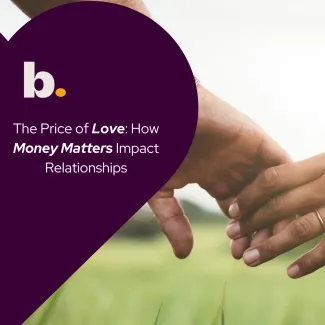
The Price of Love: How Money Matters Impact Relationships
“Can’t buy me love.” It’s a song. It’s a movie. It’s a pervasive sentiment in culture when we think and talk about the tensions that exist among the ideas of happiness, finance, and romance. And while money may not buy love, how we think and communicate about money definitely impacts our intimate relationships.
Finances can stir up almost as many emotions in humans as love or attraction do. So, how can we facilitate productive conversations around the topic of money with those closest to us? Let’s talk through some of the common communication breakdowns that are typical in conversations with intimate partners about money and examine ways to better navigate the confluence of intimacy and finance.
According to a 2021 survey by the Harris Poll on behalf of the American Institute of Certified Public Accountants (AICPA), 73% of married or cohabiting Americans say they experience relationship tension due to financial decisions.1 That’s a lot of people! So, if you have some tension in your intimate financial relationships, you just realized you’re basically like the rest of us. So, what can we do?
We all think differently about money, but getting on the same page with your partner is critical to avoiding long-term and sometimes irreconcilable problems.1 We have some ideas that might help.
Five Points of Financial Friction
Getting more in sync with your significant other when it comes to money is possible if you know where your friction points are. Here are five financial issues that have the potential to derail even the best match.2
1. Differences in Financial Goals
If one of you wants to squirrel away all your coffee money to save up for a vacation home but the other wants to focus on saving for global travel abroad, you will need to talk about where you can find compromise and how you can arrange your timeline so that both people are working toward a shared vision.
A financial advisor can work with you both to establish short and long term goals and help build a strategy that puts you on a path to achieve them.
2. Little Talk About Big Money Decisions
When one partner has all the financial information and makes all the major financial decisions largely on their own, this can sometimes be a recipe for friction. Even if it’s being done in a well-meaning effort to try not to burden the other, it can end up having negative and unanticipated consequences.
Getting aligned on what your guardrails or thresholds are in your relationship that you want to automatically trigger a discussion between you and your partner before the decision is made or money is spent can do a lot to mitigate difficulty.
We try to encourage our married or partnered clients to include both members of the relationship in all meetings we have with them so that these conversations are transparent, and productive. It also helps each partner to be heard and ensures that both are on the same page regarding goals and strategy. Communication in a moderated setting can go a long way.
3. Financial “Infidelity”
This is an issue that can cause a lot of trouble in a relationship. But what is it? Basically, financial infidelity happens in a couple with shared finances when one partner conceals, lies, or otherwise misleads the other about money.3 It could be lying about the number of credit cards you or your partner have, or the balances you’re carrying. Or maybe it’s concealing a significant purchase, or hiding other debts.
Financial infidelity is also surprisingly common. A 2021 survey from the National Endowment for Financial Education found that 39% of respondents say they’ve hidden cash, statements, bills, or purchases from a partner, and 21% say they’ve lied about finances, debt, or money earned. When asked why they commit financial infidelity, 38% say they believe some aspects of money should be private, 34% fear disapproval from a spouse, and 33% say they’re embarrassed or fearful of finances and don’t want to share.3
As difficult as it can be, being transparent about your financial situation and creating a supportive environment where you and your partner feel comfortable sharing good and bad financial information can help rectify any strife or conflict. Again, open communication around finances is key.
4. Different Spending Habits
If you and your partner have different spending habits, you know they can lead to fundamental disagreements. Although you may never be able to fully change each other’s mindsets about spending, there can be ways to come to a happy medium.
Setting a budget that allows each of you to have a certain amount of discretionary spending on items or experiences that matter to you can help you each retain a sense of independence, while also working toward bigger shared goals.
A financial professional can give you an outside opinion on your different spending behaviors and hopefully guide you to reach mutually agreeable common ground.
5. Engaging financial professionals in your pursuit of financial harmony
Relationships are seldom effortless. We all need to put the time in and work on it every day. When it comes to the stresses that finances add to the mix, financial professionals can help navigate conflicts.
We assist couples in managing their financial differences by:
• Identifying financial goals and priorities, assisting couples in clarifying their individual and shared financial objectives, focusing on alignment, and managing potential conflicts.
• Developing a comprehensive financial strategy to create a personalized financial roadmap that addresses investment decisions and retirement considerations.
• Educating couples on financial concepts and strategies to help them make informed decisions when managing their finances.
• Providing guidance that offers insights based on the couples' financial circumstances and risk tolerance.
While celebrating Valentine’s Day, it can be helpful to acknowledge that a lack of communication, differing values, and power imbalances can often turn natural psychological inclinations about money and occasional financial challenges into real personal strains. Open communication and teamwork can be key to a healthy relationship. As financial professionals, we can strengthen the financial side of your relationship by creating roadmaps that help ease friction.
If you – or you and your partner – want to talk about your finances, we at Beirne welcome the chance to speak to you.
1 Experian.com, February 17, 2023 https://www.experian.com/blogs/ask-experian/money-issues-that-can-hurt-relationship/#:~:text=A%20massive%2073%25%20of%20married,impacts%20intimacy%20with%20their%20partner
2 https://www.investopedia.com/terms/f/financial-infidelity.asp
3 “Financial Infidelity Survey,” Harris On Demand Poll, July 7, 2021

